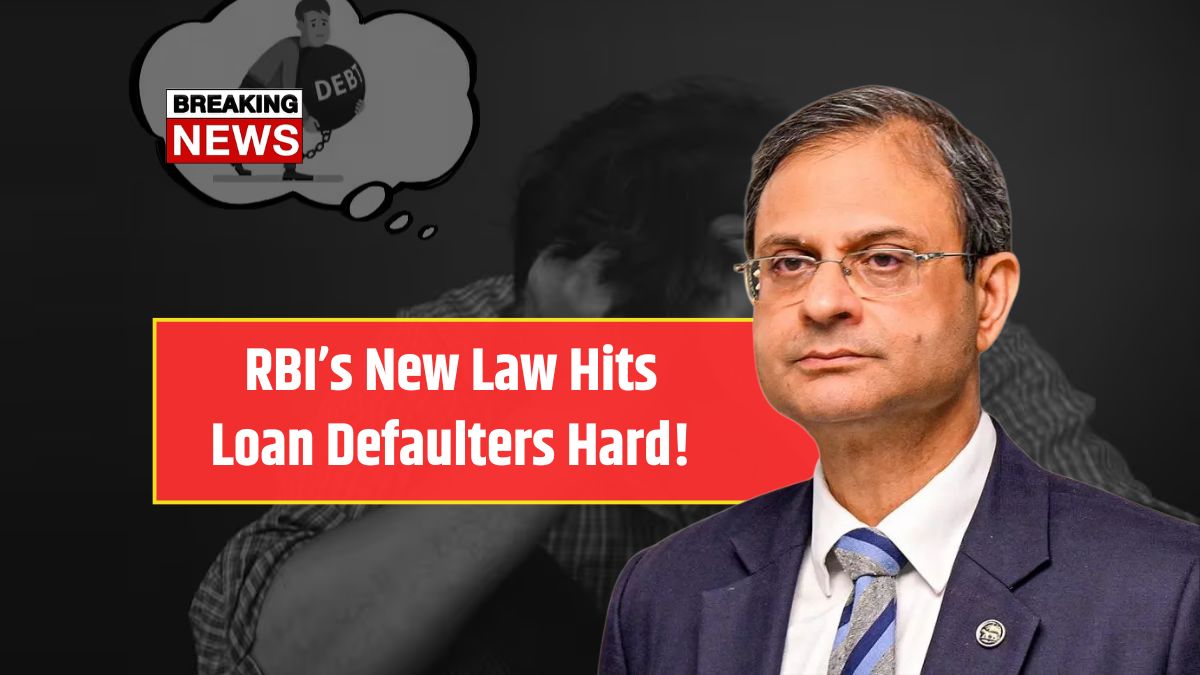New RBI Rules – In 2025, the Reserve Bank of India (RBI) introduced significant changes to how financial institutions handle loan defaulters and cheque bouncers. With the banking sector grappling with increasing non-performing assets (NPAs) and rising cases of loan defaults, the RBI’s new rules are aimed at tightening the noose around defaulters and making it harder for individuals or businesses to get away with defaults. If you’ve ever delayed a loan payment or had a cheque bounce, these new regulations could impact your financial future.
Why Did the RBI Introduce These New Rules?
India’s financial system has been struggling with an increasing burden of bad loans. As of 2024, non-performing assets reached ₹10.3 lakh crore, and there were more than 60 lakh cases of cheque bounces pending in courts across the country. Furthermore, the rise in willful defaulters—people who intentionally avoid paying their loans—has increased by 18% year on year. In response to these issues, the RBI has decided to grant banks and non-banking financial companies (NBFCs) the power to take faster and more effective action against defaulters.
Key Features of the New RBI Rules
The new RBI guidelines rely heavily on technology to ensure faster enforcement and more transparency in the system. Banks are now required to report any missed loan payments within 24 hours. The RBI will publish a list of chronic defaulters, making it public knowledge. Additionally, if a cheque bounce exceeds ₹10,000, the bank has the authority to freeze the account temporarily. Legal action can be triggered within 48 hours of a bounced cheque, which is a significant reduction in the time previously allowed for action. The RBI has also set up a centralized data system to monitor high-value defaulters across multiple institutions, which will help in ensuring a quicker response.
The rules also include an increase in penalties for repeat offenders. Those who repeatedly miss loan payments or bounce cheques will face higher interest rates, more stringent collateral requirements, and even asset seizures in some cases. The RBI has also set up special enforcement teams to help banks and NBFCs implement these changes effectively.
What Has Changed for Loan Defaulters?
The rules for loan defaulters have been tightened. Previously, banks had up to 30 days to take action after a missed EMI, but now the action begins within 7 days. If you miss two payments in a row, the bank will start recovery calls much sooner, and you could face a fine or other penalties. For personal loans, the bank will send a legal notice much earlier, and the interest rates could increase. In the case of business loans, the bank may issue asset seizure orders if the loan remains unpaid for 15 days.
Home loan defaulters will also face foreclosure warnings earlier than before, with the bank notifying them within 10 days of missed payments. If a borrower has deliberately avoided paying a loan for over 90 days, they will face blacklisting and even court action. Credit card defaulters will find their credit scores permanently damaged if they miss payments for more than 10 days. The stricter timelines and harsher penalties will make it more difficult for defaulters to escape the consequences of their actions.
Tougher Consequences for Cheque Bouncers
The consequences for cheque bouncers have also become more severe. In the past, cheque bouncers could receive a soft warning for amounts below ₹10,000, but now they will face a temporary freeze on their accounts if they have been flagged as high-risk. For bounced cheques between ₹10,000 and ₹50,000, a fine of up to ₹2,000 will be levied, and legal action can be initiated quickly. If the cheque amount is between ₹50,000 and ₹2 lakh, the bank will file an FIR and initiate a digital complaint. For amounts above ₹2 lakh, the defaulter could face asset attachment and even court action.
Repeat offenders will be blacklisted after three instances of cheque bouncing, and businesses that fail to honor their cheques will face penalties at both the company and director level. The new rules also make it harder for government vendors to get away with cheque bounces, as contracts can be canceled, and they can be publicly blacklisted. This tough stance on cheque bouncers is designed to instill greater discipline in the financial system.
New Tools for Banks and NBFCs
To help enforce these rules, the RBI has given banks new technological tools. AI-powered risk prediction models allow banks to predict when a default is likely to occur, enabling them to act proactively. Borrowers will now receive mobile alerts about upcoming EMI payments, and banks will have access to a centralized dashboard to track high-risk accounts. The new system also allows for instant generation of Section 138 notices and fast-tracking of legal proceedings. Banks will also have a unified compliance interface that will help loan officers identify repeat defaulters more easily, ensuring that violations are dealt with quickly.
How These Changes Impact You
The RBI’s new rules are not just aimed at corporate defaulters; they also apply to everyday borrowers. If you’ve ever been late on a home loan, missed an EMI, or bounced a cheque, the new rules will impact you. Missed payments will be flagged much faster, and recovery calls will begin within days. If you’ve bounced a cheque, you might lose your cheque-writing privileges for months, depending on the severity of the offense. Additionally, if you’ve borrowed money using false documents, the RBI’s interlinked system could report you to multiple agencies, affecting your creditworthiness and making it harder for you to get future loans.
Expert Advice for Borrowers
To stay on the right side of the new rules, borrowers should aim to pay EMIs a few days before the due date to avoid penalties. If you have to write a cheque, make sure the funds are available to avoid bouncing it. Regularly check your credit score to stay informed about your financial standing. Setting up auto-debit for your loan payments is another great way to avoid missing due dates. If you receive any warning notices from your bank, take immediate action to prevent the situation from escalating.
A New Era of Financial Discipline
The RBI’s new rules are a bold move toward a more disciplined and transparent financial system. While they might seem strict, these changes are ultimately meant to protect responsible borrowers and ensure that the banking sector remains stable. If you’ve been responsible with your finances, these changes should not cause you any problems. However, for those who have been careless, 2025 will be a wake-up call.




